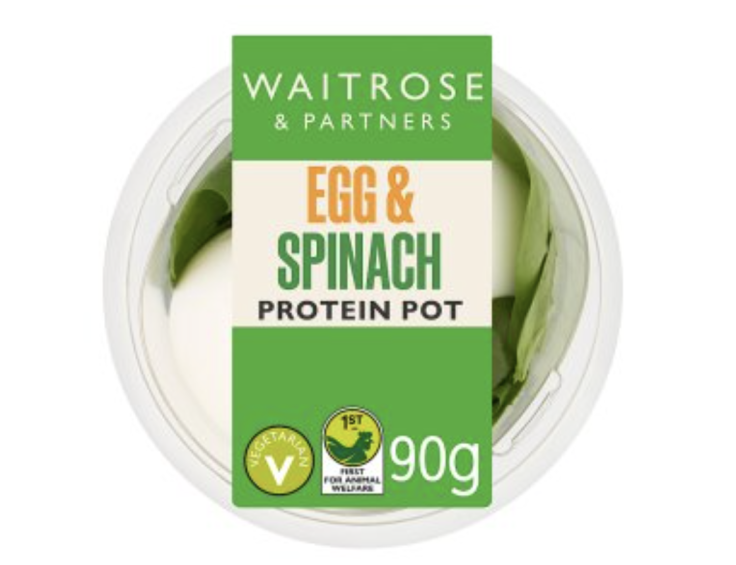Waitrose Recalls Popular Lunch Item Over Fears it May Cause 'Fevers, Diarrhoea and Abdominal Cramps'

Waitrose has urgently recalled its Egg and Spinach Protein Pot 90g amid concerns that it may be contaminated with Salmonella, the Food Standards Agency (FSA) announced on 29 July 2025.
The recall covers pots with use-by dates of 31 July 2025 and 1 August 2025, and applies to all Waitrose stores selling the implicated batches.
Customers are advised not to consume the product and should return it to the store for a full refund. Point‑of‑sale notices have been displayed in affected stores to inform shoppers and staff.
Risk of Illness: Salmonella Symptoms Explained
The FSA warned that Salmonella infection typically causes fever, diarrhoea and abdominal cramps—symptoms that can lead sufferers to feel unwell for several days. Anyone experiencing them is advised to stay away from work, school or nursery until 48 hours after symptoms cease to avoid spreading the infection.
Salmonella is a common cause of foodborne illness, often seen in eggs and lightly cooked foods. While most cases resolve with rest and hydration, vulnerable groups such as young children, the elderly and those with compromised immune systems may require medical intervention.
Waitrose Response and Consumer Advice
In its statement, Waitrose apologised for the inconvenience and reiterated that the recall is a precautionary measure. Customers affected by this issue should return the product for a refund, regardless of whether a receipt is provided.
The FSA emphasised its approach to swiftly inform consumers and protect public health via formal food alert notices and in-store displays. Individuals concerned about symptoms are encouraged to seek medical advice, particularly if they belong to a risk group.
Context: Rising Salmonella Cases in the UK
Salmonella infections in the UK reached their highest levels in over a decade during 2024, with 10,388 laboratory-confirmed non-typhoidal cases—a 17.1% increase from 8,872 cases in 2023. Children under 10 years old were particularly affected, accounting for around 21.5% of cases.
These numbers reflect a continued upward trajectory from pandemic-era lows, rising from 8,125 cases in 2022 and earlier. Early 2025 reports indicate outbreaks linked to contaminated produce, such as rare Salmonella strains associated with tomatoes, have heightened public safety concerns.
Why the Surge Matters and Who's at Risk
The increase in Salmonella infections typically indicates lapses in food safety standards throughout the supply chain, from production to consumption. The primary risk foods include poultry, eggs, raw vegetables, meat and unpasteurised dairy products.
Although most healthy individuals suffer mild symptoms, such as fever, diarrhoea and abdominal cramps, lasting a few days, high-risk groups like young children, the elderly, and immunocompromised individuals may experience more severe illness or complications requiring medical treatment.
Home Defence: The Vital '4 Cs' of Food Safety
Food safety authorities, including the Food Standards Agency (FSA) and the UK Health Security Agency (UKHSA), advise households on basic hygiene measures to reduce the risk of infection. The key principles, known as the '4 Cs', are:
- Cleaning surfaces, utensils, and hands regularly,
- Cooking food thoroughly to recommended temperatures,
- Chilling perishables promptly to slow bacterial growth,
- Avoiding Cross-contamination between raw and cooked food items.
Experts stress that strict adherence to these practices is especially critical during a spike in Salmonella cases. For instance, when preparing raw foods like eggs, produce, or egg-based meals. Maintaining kitchen hygiene remains one of the most effective ways to prevent infection.
Broader Recall Landscape
This surge in Salmonella cases follows a series of high-profile food recalls across UK supermarkets. Just days ago, Tesco pulled three of its popular pasta salad products from shelves after detecting potential Salmonella contamination, urging customers not to consume the items.
Meanwhile, Waitrose recently withdrew its 'Indian Takeaway for Two' ready meal, not due to microbiological reasons, but because of undeclared allergens, including sesame and soya, which pose serious health risks for allergy sufferers.
While the causes differ, these recalls reflect persistent supply-chain vulnerabilities, from ingredient sourcing to final packaging. They also highlight the growing pressure on retailers to maintain rigorous safety protocols amidst rising scrutiny.
For consumers, such incidents serve as a reminder of the critical role of food labelling, traceability, and timely intervention in protecting public health.
© Copyright IBTimes 2025. All rights reserved.





















